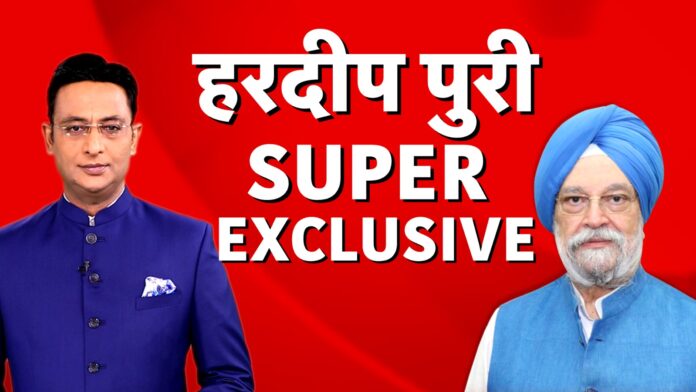New Delhi | August 31, 2023: News18 India’s Managing Editor Kishore Ajwani conducted an exclusive interview with Hardeep Singh Puri, Union Minister of Petroleum & Natural Gas and Housing and Urban Affairs. The interview centered around the government’s decision to reduce the price of Liquefied Petroleum Gas (LPG) cylinders for domestic use by Rs 200 per cylinder, as announced by Union Minister Anurag Thakur. This reduction amounts to an 18 per cent decrease in the cost of a 14.2-kg cooking gas cylinder. The interview unveiled significant insights into the context, rationale, and implications of this decision.
Union Minister Hardeep Singh Puri began by addressing questions about the timing of Prime Minister Modi’s decision to lower LPG prices. He asserted that the opposition’s concerns regarding the timing need not overshadow the significance of the decision itself. Stressing the democratic nature of the government, the minister underscored that the decision was taken in honour of the upcoming Rakshabandhan festival, symbolizing the government’s commitment to the welfare of India’s sisters.

Highlighting the transformative journey of access to LPG, Mr. Puri illuminated the evolution from a time when 45% of India’s population lacked LPG access before 2014. This stark reality has evolved into a commendable achievement, with the total number of LPG connections growing from 14 crore to 32 crore in 2023, he added. The ‘Ujwala Yojana’ scheme stands out as a cornerstone of this achievement, benefiting 9 crore 60 lakh beneficiaries who receive a direct 200 rupee subsidy. Minister Puri further revealed that even those not covered by the scheme would now enjoy a reduced cylinder price of 900 rupees from the earlier 1100 rupees, while Ujwala Yojana beneficiaries would be entitled to LPG cylinders at an astonishingly affordable 700 rupees. Future plans to expand the Ujjwala Yojana by approximately 75 lakh connections underscore the government’s resolute mission to ensure universal LPG access.
When queried about the potential reduction of petrol and diesel prices, the Union Minister responded with an emphasis on fair comparisons. He raised questions concerning non-BJP states’ reluctance to reduce VAT in response to the central government’s reduction of central cess. The minister detailed a pattern of global petrol and diesel price increases, contrasting it with India’s remarkable feat of reducing petrol prices by 5% and diesel prices by 0.28% over the past two years.
He then engaged in a state-by-state analysis, drawing attention to the difference in petrol and diesel prices between BJP and non-BJP states. The significant variance in VAT rates painted a compelling picture, with petrol prices differing by up to 11.85 rupees and diesel prices by 10.67 rupees.
ALSO READ: #News18MeraTiranga Campaign takes the Metaverse by Storm on Independence Day
Expanding the horizon, he embarked on an international comparison spanning neighbouring countries. He referred to the data showcasing India’s praiseworthy position of reducing petrol prices by 5% while its neighbours experienced notable increases, ranging from 24.91% to 50.56%. Even on the global stage, the USA encountered a substantial 43.33% rise in petrol prices, in stark contrast to India’s reduction. Similarly, Germany and France, as major G20 countries, witnessed price increases of 18.56% and 22.56% respectively.
The discourse extended to diesel prices, revealing India’s 0.28% reduction against Sri Lanka’s 87.25% surge and the USA’s 36.70% increase. Mr. Puri also highlighted the government’s visionary steps in reducing LPG cylinder prices, benefitting each citizen by 200 rupees and Ujjwala Yojana beneficiaries by 400 rupees, a testament to Prime Minister Modi’s commitment to the welfare of the people.
Addressing concerns about election-driven motives, he firmly articulated that elections are inherent to India’s democratic fabric and are independent of policy decisions. The LPG price reduction, a gesture of benevolence to women, aligned with the broader initiatives of women’s empowerment, extended maternity leave, and the abolition of triple talaq.
The Union Minister also delved into the challenges posed by “Oil bonds,” underscoring the consequences of past financial decisions and the government’s resolute approach under Prime Minister Modi’s leadership.
The interview explored other dimensions of governance, including urban pollution and upcoming events. Mr. Puri’s insights provided a comprehensive understanding of the government’s vision, its accomplishments, and the commitment to India’s progress.
This year Educate yourself and develop your career with EasyShiksha

































































